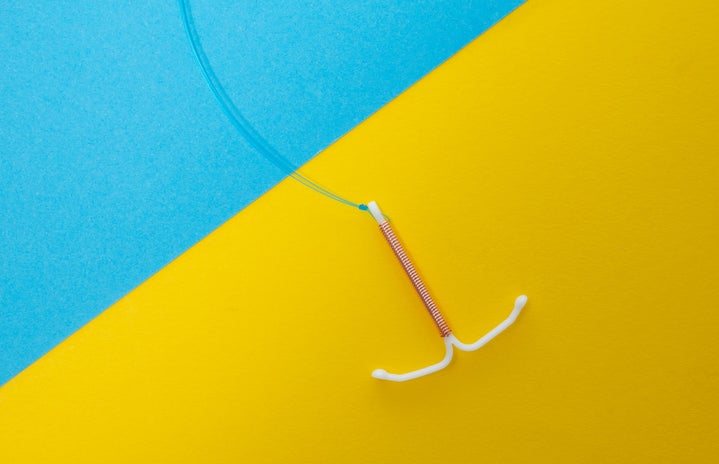Let’s be real — contraceptives are confusing. Why are there so many different types that exist for women and men to use? What even is a contraceptive? Well, a contraceptive is a method or device used to prevent pregnancy. Each type of contraceptive is unique in its own fun, special way! So let’s talk about some of the different types of contraceptives that might be right for you!
- Intrauterine Device (IUD)
-
If you want an almost foolproof method of birth control, an IUD is perfect for you — they are more than 99% effective! An IUD is a tiny little device that is put into the uterus to prevent pregnancy. This IUD is perfect if you are forgetful, as this is simply inserted into your uterus, and then you forget about it until you need to get it taken out and replaced. There are two types of IUDs: copper IUDS and hormonal IUDs. The copper IUD is wrapped in a tiny piece of copper, whereas the hormonal IUD uses the hormone, progestin, to prevent pregnancy! Both types of IUDs stop the sperm from reaching the egg, and can stop a fertilized egg from attaching to the wall of the uterus. A copper IUD typically lasts 12 years, but the hormonal IUDs last anywhere between 3 to 7 years — it just depends what type you get! There are some of advantages of getting an IUD over other types of birth control like how it does not get in the way of sex, it can be forgotten about (for a certain amount of time at least), and that it has a small effect on your hormones! It is important to note that when you get an IUD put in, you may experience some cramps and pain. With that being said, a small amount of pain for a short period of time is worth all of the benefits of getting an IUD!
- Birth Control Implant
-
Similar to the IUD, this method of birth control is inserted into your body. The birth control implant, however, is a tiny thin rod (about the size of a matchstick) that is inserted into your upper arm instead of your uterus. Your arm is numbed when you get the implant so you do not feel it going into your arm. This implant releases the hormone, progestogen, that thickens the mucus in your cervix so no loose sperm can reach an egg (I know that sounds gross but it’s better than getting pregnant)! Implants last up to 5 years. The implant is essentially the exact same thing as an IUD except for the fact that it goes into your arm, and has all of the same benefits. A key thing to note with implants is that you might develop irregular periods or periods that are longer — this is especially common for the first 6 months but can last for the entire duration you have the implant. This is another great method of birth control if you are forgetful!
- Birth Control Shot
-
The birth control shot, also known as Depo-Provera, the Depo shot, or DMPA, also contains the hormone progestin. It’s just like an IUD and implant, except you have to get a shot of it every 3 months. You are able to either schedule appointments every 3 months, but there are some circumstances where you are able to get a supply of the shots and give it to yourself. You can receive your follow up shot as early as 10 weeks after your last shot, but latest after 15 weeks. This method of birth control is supposed to be 99% effective, although people do forget to get the shot, thus making it 94% effective. Some of the side effects of the birth control shot are spotting, bleeding more days than usual on your period, as well as weight gain, depression, and bruising where you get your shot. These are only some of the side effects and how your body reacts to it could be completely different. This method of contraceptives could be good for anyone that does not hate needles and is okay with going to see a doctor or nurse multiple times a year.
- Birth Control Pill
-
Birth control pills are a pack of pills for a certain amount of weeks that you take once a day! The hormones that the pill releases stop ovulation, so that means no eggs will be accessible for sperm to reach. This method of birth control is not friendly to those of us that are forgetful since you need to take the pill everyday around the same time. In most pill packs, there will be a certain amount of pills that are non-hormone pills or sugar pills, that will ensure you get a period. There are some pill packs that do not have the non-hormone pills, and only hormone pills, so you will most likely not get your period if you only take the hormone pills! While, theoretically, the pill is supposed to be 99% effective, it is easy to forget or miss taking a pill, SO the realistically it is 91%. When you first begin taking the pill, your body will be reacting to the new hormones entering your body which can result in nausea, headaches, sore breasts, change of periods, and more. It is important to give your body a chance to adjust to the pill, so if you’re able to, try and stick it out and see how your body adjusts. The pill not only helps prevent pregnancies, but it also helps with heavy, painful periods and calms down any cramps or PMS you may experience!
- Condoms
-
Condoms. Use them every damn time. Condoms are thin, stretchy barriers that go around the penis. There are also internal condoms for people with vaginas to insert into themselves. Condoms prevent the sperm from entering the vagina completely (unless it is an expired condom). They are usually 98% effective, especially if there are multiple types of contraceptives being used. Condoms can be torn and can slip off during sex and this can be for many different reasons, so it’s always important to make sure it is still hanging on. Not only do condoms serve as a contraceptive, but they also protect against sexually transmissible infections! Condoms are a great way to double up on contraceptives as it provides protection against pregnancy and getting a STI. Do not be fooled though — many people will try and tell you they cannot feel anything with a condom on their penis. This is not true, they can — so stay safe and stay protected!
- The Pull Out Method
-
The pull out method is the act of keeping semen away from the vagina. Just like how it is named, the act of pulling out is where you pull the penis out of the vagina right before ejaculation. This is one of the least effective methods of birth control because if any semen enters the vagina the partner is not on any form of birth control, they will most likely get pregnant. 22 out of 100 people will get pregnant if they use the pull out method. The only way for this method to be super effective, is if another type of birth control is used like the pill, or an IUD, or a condom. This method should only really be used if it is with another birth control or if there is literally no other form of birth control available.
Birth control comes in so many different mediums — I only managed to cover a few of the most effective (and the least effective) contraceptive methods that exist. It is so important to truly study the type of birth control you want to use before using it since birth control affects our bodies so much. Now that you know some of your options of contraceptives, go have some fun safe, hopefully protected sex!


